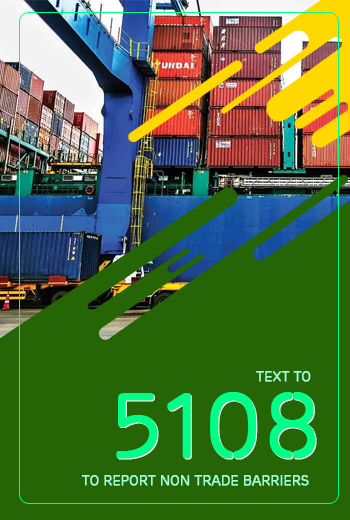NTBs Elimination progress in EAC
Home > > NTBs Elimination progress in EACThe elimination of NTBs reduces both time and costs in trading across borders in East Africa. {{Adoption of Customs Union Protocol}} adopted in {{2004}} with Article 13 on NTBs. {{Customs Union (2005)}}: The Customs Union is the first Regional Integration milestone which has been in force since 2005. The Customs Union states that EAC Partner States have agreed to establish free trade (or zero duty imposed) on goods and services amongst themselves and agreed on a common external tariff (CET), whereby imports from countries outside the EAC zone are subjected to the same tariff when sold to any EAC Partner State. The union was fully operational{{ in 2010.}} The EAC Partner States have agreed to remove all existing NTBs to trade and not to impose any new ones and established the NTB Monitoring Mechanism in 2007, in an effort to strengthen the efforts to monitor the occurrence of NTBs, as envisaged under Article 13 of the EAC Customs Union Protocol. The key mechanism for monitoring and coordinating NTB elimination is the National Monitoring Committee (NMC) on NTBs. {{EAC Time Bound Programme on Eliiomination of Identified/reported NTBs (2009)}}: As part of the Customs Union Protocol, the EAC member states put in place the programme which was launched to improve trade in the region. Under this programme, monitoring and reporting of NTBs is facilitated at national and regional levels and is conducted at various stages by relevant trade officials. A significant result of the NTBs programme has been the enactment of tThe EAC Elimination of NTB Act. {{Common Market (2010): }} The Common Market is the second Regional Integration milestone of the EAC which has been in force since 2010. , It follows the Customs Union. The common market means that EAC Partner States maintain a liberal stance towards the four Freedoms of movement for all the factors of production and two Rights between themselves. These Freedoms and Rights include: Free Movement of Goods, Free Movement of Persons, Free Movement of Labour / Workers, Free Movement of Services, Free Movement of Capital and Right of Establishment, Right of Residence. {{EAC NTBs Act (2015)}}: was passed by the East African Legislative Assembly (EALA) in February 2015.A great value of the NTB Act is the possibility for the Council of Ministers to recommend to the Summit the imposition of sanctions against a Partner State, which fails to comply with any directive, decision or recommendations of the Council. The NTB Act remains a landmark milestone in the work in support of the progressive elimination of NTBs within the EAC. {{One Stop Border Posts (2016):}} This is another EAC milestone in NTBs elimination, it aims at the facilitating trade and free movement of goods in the region. One Stop Border Post (OSBP) is a border facility that combines two stops for national border control processing into one and consolidates border control functions in a shared space for exiting one country and entering another. {{2017: enactment of the EAC NTBs Act.}} The draft bill was passed by EALA in March 2015 to form an EAC NTBs Act, 2017. The Act was assented by all EAC Partner States’ Heads of State. {{2017:}} Drafting of the implementation modalities for the EAC regulation to operationalize the NTBs Act and concurrently amending the EAC NTB Act 2017 as directed by the EAC Council of Ministers. The adoption of Tripartite Online reporting mechanism (www.tradebarriers.org ) which is an online system helping to report NTBs online and track the process for removal of the reported NTBs. {{EAC Monitoring Mechanism for identifying, monitoring and eliminating NTBs}} put in place in EAC which allows partner states to meet every quarter under the regional platform, a kind of public private dialogue comprised of officials from both the public and private sectors of all EAC partner states. The platform is entitled EAC regional forum on NTBs. The forum has been convened 28 times from {{2009 to October 2019 }} meaning an average of 3 meetings every year. Average 25 NTBs have been removed every year by EAC Partner States making a total of 199 removed NTBs from{{ 2010 to 2019}} According to the latest Transport Observatory Report of June 2019, the average container dwell time at the port of Mombasa has seen a steady decrease in 2016 and 2017; but increased slightly to 106 hours in{{ 2018. }} Trade facilitation efforts in the EAC, through support of TMEA and other development partners, have led to faster customs clearance and speedier handling of cargo at ports and terminal depots. This has ultimately led to reduced dwell time (3.5 days in Mombasa and 8.5 days in Dar es Salaam), reduced port inefficiencies and congestion at the ports. The turnaround time for trucks has also moved from 1 trip to between 2 and 3 return trips per month from Kigali to the ports of Dar es Salaam and Mombasa.
News on trade facilitation
Regional business community gets $3.2m funding for trade facilitation
2020-05-07 12:04:24

